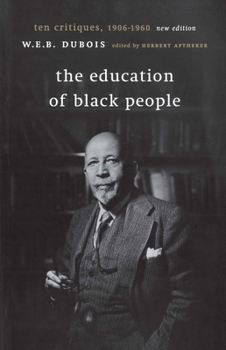The Education of Black People: Ten Critiques, 1906 - 1960
Select Format
Select Condition 
Book Overview
Undoubtedly the most influential black intellectual of the twentieth century and one of America's finest historians, W.E.B. Du Bois knew that the liberation of African Americans required liberal education and not vocational training. He saw education as a process of teaching certain timeless values: moderation, an avoidance of luxury, a concern for courtesy, a capacity to endure, a nurturing love for beauty. At the same time, Du Bois saw education as fundamentally subversive. This was as much a function of the well-established role of education-from Plato forward-as the realities of the social order under which he lived. He insistently calls for great energy and initiative; for African Americans controlling their own lives and for continued experimentation and innovation, while keeping education's fundamentally radical nature in view. Taken together, these ten essays cover half a century during which the social, political, and technological transformations were unparalleled by any in recorded history. And while Du Bois reflects these changes, certain constants persist: a demand for excellence, sacrifice, and a life of service; and an insistence that while such a life will bring hardships and temptations, it will also bring fulfillment. In Du Bois's view, only with such a life will one truly live. In this affirmation, there runs a particular feeling that the history of African Americans has profoundly influenced their ideas about service, of compassion, of justice. Though containing speeches written nearly one-hundred years ago, and on a subject that has seen more stormy debate and demagoguery than almost any other in recent history, The Education of Black People approaches education with a timelessness and timeliness, at once rooted in classical thought that reflects a remarkably fresh and contemporary relevance.
Format:Paperback
Language:English
ISBN:1583670432
ISBN13:9781583670439
Release Date:May 2002
Publisher:Monthly Review Press
Length:183 Pages
Weight:0.66 lbs.
Dimensions:0.6" x 5.5" x 8.5"
Customer Reviews
1 rating
Required Reading
Published by Thriftbooks.com User , 23 years ago
Thankfully this book has been reprinted, along with a new 2001 introduction by Herbert Aptheker (who puts in a gentle "slam" of David Levering Lewis's two Pulitzer Prize winning biographies for good measure). The picture of Du Bois on the new cover is another one of those "I am God and You are not worthy" type of pictures. I've gone and made it one of my screen savers.Du Bois's prescient and practical advice is, as usual, pretty much on target. It is also interesting to observe the evolution in his thinking in the fifty-four years covered in this slim (you can read this book in a couple of sittings) volume. He answers some eternally debated questions: To whom should college presidents and administrations be ultimately accountable? (Alumni) What is the point of a liberal education? (character) etc.This book goes far beyond the "Booker T vs. W.E.B." educational debates that dominated 100 years ago (and that most people remember). It provides specific pedagogical advice and is written in the typical Du Boisian style; lucid, straightforward, inspirational. The man lived longer than most, and did a whole lot while he was alive. In its own way this little book is just as important, if not more so, than the other little book for which he is justifably famous, "The Souls of Black Folk."





